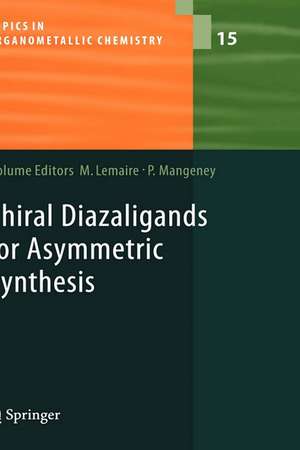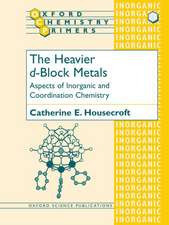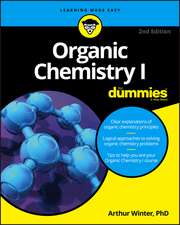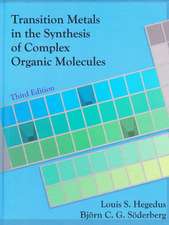Chiral Diazaligands for Asymmetric Synthesis: Topics in Organometallic Chemistry, cartea 15
Editat de Marc Lemaire, Pierre Mangeneyen Limba Engleză Hardback – 20 oct 2005
| Toate formatele și edițiile | Preț | Express |
|---|---|---|
| Paperback (1) | 1816.59 lei 43-57 zile | |
| Springer Berlin, Heidelberg – 12 feb 2010 | 1816.59 lei 43-57 zile | |
| Hardback (1) | 1822.76 lei 43-57 zile | |
| Springer Berlin, Heidelberg – 20 oct 2005 | 1822.76 lei 43-57 zile |
Din seria Topics in Organometallic Chemistry
-
 Preț: 764.59 lei
Preț: 764.59 lei - 18%
 Preț: 1660.02 lei
Preț: 1660.02 lei - 15%
 Preț: 637.78 lei
Preț: 637.78 lei - 18%
 Preț: 1215.70 lei
Preț: 1215.70 lei - 18%
 Preț: 1824.95 lei
Preț: 1824.95 lei - 18%
 Preț: 1821.03 lei
Preț: 1821.03 lei - 18%
 Preț: 1826.37 lei
Preț: 1826.37 lei - 18%
 Preț: 1824.19 lei
Preț: 1824.19 lei - 18%
 Preț: 1822.26 lei
Preț: 1822.26 lei - 18%
 Preț: 1219.94 lei
Preț: 1219.94 lei - 18%
 Preț: 1823.39 lei
Preț: 1823.39 lei - 18%
 Preț: 1824.64 lei
Preț: 1824.64 lei - 18%
 Preț: 1823.20 lei
Preț: 1823.20 lei - 18%
 Preț: 1218.38 lei
Preț: 1218.38 lei - 18%
 Preț: 1820.22 lei
Preț: 1820.22 lei - 18%
 Preț: 1221.51 lei
Preț: 1221.51 lei - 18%
 Preț: 1219.63 lei
Preț: 1219.63 lei - 18%
 Preț: 1818.65 lei
Preț: 1818.65 lei - 18%
 Preț: 1208.92 lei
Preț: 1208.92 lei - 18%
 Preț: 1823.39 lei
Preț: 1823.39 lei - 18%
 Preț: 1811.69 lei
Preț: 1811.69 lei - 18%
 Preț: 1214.27 lei
Preț: 1214.27 lei - 18%
 Preț: 1813.92 lei
Preț: 1813.92 lei - 18%
 Preț: 1821.51 lei
Preț: 1821.51 lei - 18%
 Preț: 1814.73 lei
Preț: 1814.73 lei - 18%
 Preț: 1216.48 lei
Preț: 1216.48 lei
Preț: 1822.76 lei
Preț vechi: 2222.87 lei
-18% Nou
Puncte Express: 2734
Preț estimativ în valută:
348.79€ • 365.08$ • 290.30£
348.79€ • 365.08$ • 290.30£
Carte tipărită la comandă
Livrare economică 31 martie-14 aprilie
Preluare comenzi: 021 569.72.76
Specificații
ISBN-13: 9783540260646
ISBN-10: 3540260641
Pagini: 310
Ilustrații: X, 302 p. 332 illus.
Dimensiuni: 155 x 235 x 22 mm
Greutate: 0.62 kg
Ediția:2005
Editura: Springer Berlin, Heidelberg
Colecția Springer
Seria Topics in Organometallic Chemistry
Locul publicării:Berlin, Heidelberg, Germany
ISBN-10: 3540260641
Pagini: 310
Ilustrații: X, 302 p. 332 illus.
Dimensiuni: 155 x 235 x 22 mm
Greutate: 0.62 kg
Ediția:2005
Editura: Springer Berlin, Heidelberg
Colecția Springer
Seria Topics in Organometallic Chemistry
Locul publicării:Berlin, Heidelberg, Germany
Public țintă
ResearchCuprins
D. Savoia: Progresses in the Asymmetric Synthesis of 1,2-Diamines from Azomethine Compounds.- O. Chuzel, O. Riant: Sparteine as a Chiral Ligand for Asymmetric Catalysis.- E. Schulz: Use of N,N-Coordinating Ligands in Catalytic Asymmetric C-C Bond Formations: Example of Cyclopropanation, Diels-Alder Reaction, Nucleophilic Allylic Substitution.- J.M. Fraile, J.I. García and J.A. Mayoral: Non-Covalent Immobilization of Catalysts based on Chiral Diazaligands.- S. Roland, P. Mangeney: Chiral Diaminocarbene Complexes, Synthesis and Application in Asymmetric Catalysis.- J.A.J. Breuzard, M.Lorraine Christ-Tommasino and M. Lemaire: Chiral Ureas and Thioureas in Asymmetric Catalysis.- M. Fontecave, O. Hamelin and S. Ménage: Chiral-at-Metal Complexes as Asymmetric Catalysts.
Recenzii
From the reviews:
"Unlike most previous monologs on diazaligands, this book does not restrict itself to a specific class of dinitrogen compounds; instead, it covers the synthesis and utility of a broad range of chiral dinitrogen ligands, including saturated diamines and their derivatives, bisoxazolines, and salens. Due to the size of this field, this concise volume is not comprehensive. Rather, a collection of well-chosen topical overviews of the important elements in the chemistry of chiral diazaligands has been assembled. The inclusion of traditional as well as modern uses of diazaligands illustrates the developmental trajectory and future potential of the field."
J. Am. Chem. Soc. 2006, 128, 9574
Maria C. Kozlowski, University of Pennsylvania
"Unlike most previous monologs on diazaligands, this book does not restrict itself to a specific class of dinitrogen compounds; instead, it covers the synthesis and utility of a broad range of chiral dinitrogen ligands, including saturated diamines and their derivatives, bisoxazolines, and salens. Due to the size of this field, this concise volume is not comprehensive. Rather, a collection of well-chosen topical overviews of the important elements in the chemistry of chiral diazaligands has been assembled. The inclusion of traditional as well as modern uses of diazaligands illustrates the developmental trajectory and future potential of the field."
J. Am. Chem. Soc. 2006, 128, 9574
Maria C. Kozlowski, University of Pennsylvania
Caracteristici
Provides the broad scientific readership with comprehensive summary and critical overview of a topic in organometallic chemistry Research in this rapidly developing transdisciplinary field is having profound influence on other areas of scientific investigation, ranging from catalytic organic synthesis to biology, medicine and material science









